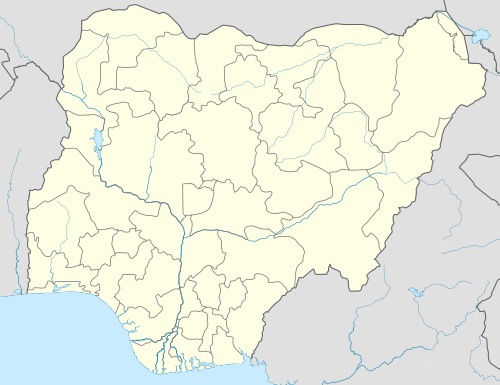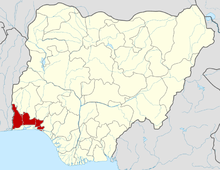Ijebu Ode
Ijebu-Ode is a town in Ogun State, South-West Nigeria, close to the A121 highway. The city is located 110 km by road north-east of Lagos; it is within 100 km of the Atlantic Ocean in the eastern part of Ogun State and possesses a warm tropical climate.
Ijebu-Ode | |
|---|---|
| |
 Ijebu-Ode | |
| Coordinates: 6°49′15″N 3°55′15″E | |
| Country | |
| State | Ogun |
| LGA(s) | Ijebu-Ode |
| Government | |
| • Type | Democratic |
| • Awujale | His imperial majesty Oba Sikiru Kayode Adetona Ogbagba II |
| • Local Government Chairman and the Head of the Local Government Council | Gbolade Ola Oladunwo[1] |
| Area | |
| • Total | 192 km2 (74 sq mi) |
| Population (2007 Census) | |
| • Total | 222,653 |
| Time zone | UTC+1 (WAT) |
| 3-digit postal code prefix | 120 |
| Area code(s) | 120101 |
According to the Britannica, by the 16th century it was established as the chief town, and since pre-colonial times it has been the capital of the Ijebu kingdom.[2] It has an estimated population of 222,653 (2007 census). It is home to Sungbo's Eredo one of the largest ramparts in West Africa.[3][4] As with most Ijebus, people from Ijebu Ode have a nationwide reputation of being natural entrepreneurs, The primary cultural food is “Ikokore”.[5] [6][7]
History

The largest city inhabited by the Ijebus, a sub-group of the Yoruba ethnic group who speak the Ijebu dialect of Yoruba, it is historically and culturally the headquarters of Ijebuland. The name “Ijebu-Ode” is a combination of the names of two persons namely, AJEBU and OLODE who were conspicuous as leaders of the original settlers and founders of the town.[8] Today, however, due to migration, colonization and inter-tribal marriage, Ijebu-Ode is now composed of a mixed people who majorly speak the general Yoruba language, as opposed to the local dialect. In 1891, the Ijebu tribe, dwelling between 50 and 60 miles north-east of Lagos on the Magbon river, set a blockade on the trade route from the interior into Lagos, which was a crown colony, and charged customs dues which served as their income. The Awujale, the traditional ruler of Ijebu, closed down the Ejirin market, cutting off Lagos from a source of up-country trade. The British government persuaded the Awujale several times to open the blockaded route but the Ijebu ruler remained adamant. However, in May 1891, a British acting governor, Captain C.M Denton C.M.G, together with some Hausa troops (mostly slaves who fled the North to South and were recruited by the British army) went to Ijebu kingdom to make an agreement with the Awujale on opening the blockaded route and allowing the free passage of goods into Lagos. The Awujale refused but after much persuasion and pressure, the Awujale agreed in January 1892 on the terms of receiving £500 annually as compensation for the loss of custom revenue. However the agreement didn't last long. A white missionary was denied access to pass through the kingdom and was sent back. The British government were provoked by the action of the Ijebus and authorized the use of force on the kingdom. Britain gathered troops from Gold Coast (Ghana), Sierra Leone, Ibadan, and Lagos (the Hausa troops nearly 150).[9]
British-Ijebu War
Also known as the Battle of Imagbon, a Colonel, F.C. Scott C.B, was the commander of the British troops numbering around 450 men. On the 12th of May, 1892, the captain and his men, including some carriers, sailed up the Lagos Lagoon and landed at Epe. When they got to Lekki, another 186 troops were recruited. On the Ijebu side, 8000 men, equipped with old rifles, were recruited to fight the British. The British underestimated the fighting prowess of the Ijebus thus giving them a hard time penetrating into the interior of the Ijebu kingdom. On the first day of battle, the British army razed down four villages with some of their men sustaining fatal injuries. The next day, they proceeded to Atumba and gunned down the Ijebus with machine guns. The British forces lost 12 men which included a Briton and 11 Africans. Every Ijebu village they came across was burnt to the ground. The Ijebus were sustaining heavy losses in battles thus far but were determined to prevent the British army from crossing the Yemoji river. The goddess of the Yemoji river was said to have taken human sacrifice in order to prevent the intruders (British) from crossing. The river was dug deeper by the Ijebus to make it impenetrable by all means for the British army. However, the British army managed to cross the sacred Yemoji river and unleashed havoc on the Ijebus. They proceeded to the village of Imagbon. The Ijebus had lost over 900 men while Britain lost only 56 men with around 30 wounded. The Ijebus were still determined to fight on but shortly afterwards, the Awujale surrendered and admitted defeat.[10]
The British union flag was later raised above Ijebu Ode. Captain Scott warned his men against pillaging which some didn't heed to especially the Ibadan irregulars who were later deprived of their arms. The toll gates in Oru built by the Ijebus were destroyed and some of their shrines were also torched. This bloody war is also known in history as the 1892 Ijebu Expedition. The British troops were awarded The East & West Africa Medal with Clasp dated ‘1892’. Today, one of these medals can be found in Fitzwilliam Museum in Cambridge. Ijebu kingdom was later annexed to the colony of southern Nigeria.[11]
Monarch

The ruler of Ijebu Kingdom, Oba S.K. Sikiru Kayode Adetona, is known as the Awujale of Ijebuland and resides in Ijebu-Ode.[12] He is regarded as the paramount ruler of Ijebu land, encompassing every town that is originally an Ijebu domain, including Ago-Iwoye, Ijebu-Igbo, Oru, Awa, Remo, Imota Ranodu known as the 10th son of Oluiwa,Ekewa Olu,Ikorodu,Agbowa ikosi,Émuren, Ijebu-Isiwo( pronounced as Ijebu Ishiwo),Odogbolu, Aiyepe, Epe, and other Ijebu territories. The Awujale is highly revered by natives and residents of these towns.[13]
Town structure
Adjacent to Ijebu Ode are several smaller towns and villages. They are mostly referred to as Egure "small settlement"; some of them include Odo-Agamegi, Ogbo, Italupe (a neighbourhood within Ijebu-Ode), Ososa, Imomo, Imawen, Odo Ogbun, Apa(Mesan), Okelamuren, Abapawa, Erunwon, Apunren, Isonyin, Imoru, Oke-Eri, Imagbon, Ijebu-Isiwo(pronounce as Ijebu-Ishiwo), Okemoyin (a village within Ijebu-Isiwo), Odo-lewu, Odo-Arawa, Idowa, Iworo, Ala, Atiba and Ibefun among others. Ijebu-Ode is made up of three parts - Iwade, Ijasi and Porogun. Italupe is a ward in Iwade, not an Egure of Ijebu Ode. The town has 39 Public Primary Schools, 14 Public Junior Secondary school, 13 public Senior Secondary Schools, 110 approved Private Nursery and Primary Schools and 22 approved Private Secondary Schools. Ijebu Ode has a local television station affiliated with the government's NTA network and is the trade center of a farming region where yam, cassava, grain, tobacco and cotton are grown.[14]
Landmarks and places
Festivals
Agemo is the unity of Ijebus. There are 16 Agemos in various part of Ijebu. They come out every July and they all meet at Ijebu-Ode before moving to Imodi Mosan, where the Agemo Festival takes place. The Agemo of Ijebu-Isiwo is called Petu-Ado (short form Petu). Agemo festival has masquerades and is a performing art of the Yoruba religion. Women are forbidden from seeing the Agemo on their way to Ijebu-Ode. A public announcement is made on radio and television to inform everyone the exact time Agemo will be moving. The Ojude Oba festival of Ijebu-Ode is usually held two days after the Ileya festival while the Ojude Oba festival of Ijebu-Isiwo is usually held three days after the Ileya. Horses with beautiful and vintage carts are usually paraded on the streets of Ijebu Ode in the hours of the morning and eventually they ride to the palace of the king to celebrate. It is a festival whose main purpose is for the people of Ijebu to come together as one to honor their king and is regarded as one of the biggest in West Africa.[15]
Notable people
The following is a list of notable people who were either born in, lived in, are current residents of, or are otherwise closely associated with or around the city of Ijebu Ode, Ogun State, Nigeria.
- Oba Sikiru Kayode Adetona, Awujale of the Ijebu Kingdom
- Professor Adebayo Adedeji, CFR, Nigerian economist and academic
- Subomi Balogun, Nigerian banker, philanthropist and founder of FCMB
- Harold Olusegun Demuren, National celebrated Aeronautical Engineer
- Adeola Odutola †, Nigerian businessman
- Chief Kunle Ogunade, Former president Nigerian Belgian Chamber of Commerce[16]
- Beatrice Aboyade, Nigerian librarian
- Ade Olufeko, Technologist who contributed to Eredo's dialogue[4]
- Abiodun Koya, American-based Opera Singer and Songwriter
- Olikoye Ransome-Kuti †, Activist, and health minister of Nigeria
- Adebowale Adefuye, Nigerian historian and diplomat
- Kola Onadipe (1922–1988), Nigerian children's author.
- Joseph Adefarasin, Nigerian High Court judge
- Oluyemi Adeniji †, a Nigerian diplomat
- Israel Oludotun Ransome-Kuti †, Nigerian clergyman and father of Fela Kuti
- Sunday Adelaja, Founder of the Embassy of God in Kiev
- Abayomi Mighty, Public Speaker, United Nations Spokesperson for African Youth and Children ( April 2001)
- Oluwatobiloba Amusan, Nigerian sprinter
- Eniola Badmus, Nigerian actress
- Esther Olukoya and Emily Ogunde, Identical twin centenarians
- DJ Jimmy Jatt, Nigerian disc jockey
- Gasper Lawal, Internationally renowned multi-instrumentalist
- Omoba Rabiu Adeniji Jagun (1897-1972), Fidipote Royal Family
- Hubert Ogunde†, Nigerian actor and playwright
- Jelili Adebisi Omotola†, Educator and Senior Advocate of Nigeria (SAN)
- Freeman Osonuga, Nigerian physician, humanitarian and public speaker
- Aina Onabolu†, Nigerian modern arts teacher and painter
- Abiola Onakoya, Nigerian sprinter
- Yusuf Otubanjo, Nigerian footballer
- Paul Adefarasin, Pastor, convener of The Experience (gospel concert) and founder of House On The Rock (Church)
- Victor Adenuga Oyenuga†, Nigerian Professor Emeritus
- Idowu Philips, Nigerian veteran actress
- Festus Segun†, Nigerian Anglican bishop
- Omololu Meroyi, Politician
- Mobolaji Bank Anthony†, Businessman and philanthropist
See also
References
- http://ogunstate.gov.ng/administration/
- "Ijebu-Ode, Nigeria". Britannica. Retrieved 5 February 2019.
- "10 Amazing Facts You Probably Don't Know About Nigeria". Guardian Nigeria. 1 October 2018. Retrieved 5 February 2019.
- "Sungbo Eredo Back Into Awareness And A Path Forward With This Xennial". June 19, 2019. Archived from the original on 2019-06-19. Retrieved July 16, 2019.
- "The Ijebu are very enterprising, shrewd and business like". Naijafilms.com. Retrieved 5 February 2019.
- "The World Gazetteer". Archived from the original on 2013-02-09. Retrieved 2007-04-05.
- "Post Offices- with map of LGA". NIPOST. Archived from the original on 2009-10-07. Retrieved 2009-10-20.
- "The historical background and formation of ijebu people". blacks.com.ng. Retrieved 5 February 2019.
- Ayomide, Tayo (8 December 2017). "How a Christian missionary caused the expedition of a great kingdom". Retrieved 5 February 2019.
- Opemipo Omipidan, Teslim. "The British-Ijebu war of 1892 (The battle of Imagbon)". oldnaija.com. Retrieved 5 February 2019.
- "British-Ijebu War of 1892 (Battle Of Imagbon)". Retrieved 5 February 2019.
- Jimilehin, Dipo (15 May 2010). "Celebrating 50 Years Reign Of Oba Adetona". Nigerian Tribune. Ibadan, Nigeria. Archived from the original on 16 May 2010. Retrieved January 7, 2012.
- Samuel, Oba (1 August 2017). "21 Facts You Need To Know About Oba Sikiru Adetona-Awujale". dailyfamily.ng. Retrieved 5 February 2019.
- "Dawn of a new era in Ijebu-Ode". The Nation (Nigeria). 13 May 2014. Retrieved 5 February 2019.
- "Discover Ijebu-Ode!". Bellafricana. Retrieved 5 February 2019.
- "Hon. Wale Okunniyi Set For Ogun East Senate Seat". City People Online. Retrieved 6 July 2019.
